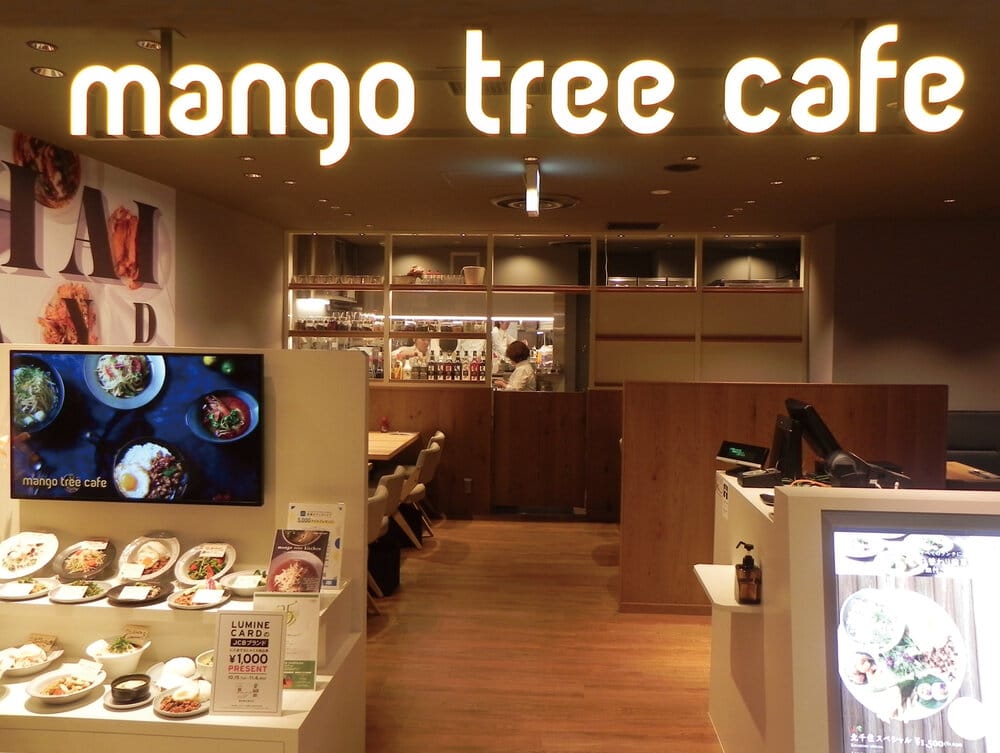Contemporary collection of new restaurants and “on-the-go” outlets rolled out in 2019, introducing three of the company’s original brands to a trio of major Japanese cities: Tokyo, Osaka and Fukuoka
Mango Tree Café Kitasenju
Mango Tree Kitchen Kinshicho
BANGKOK, THAILAND (26 November, 2019) – Mango Tree Restaurants Worldwide, the leading Thai restaurant operator, has ramped up its global expansion in 2019 with the launch of multiple new restaurants and “on-the-go” outlets in Japan, it biggest international market.
The company currently operates 30 outlets in the “Land of the Rising Sun” under six of its original brands: Mango Tree, Mango Tree Bistro, Mango Tree Café, Mango Tree Deli, Mango Tree Kitchen and COCA Restaurants. This collection has grown this year, with the opening of five new locations in three of the country’s largest gateway cities: Tokyo, Osaka and Fukuoka.
This year of growth commenced on 7 th March 2019, with the inauguration of Mango Tree Café Tenjin in Fukuoka, which became the first Thai restaurant on Kyushu Island to be operated as a franchise with a Thailand-based company. Set in the Solaria Plaza, a major lifestyle mall directly connected to Nishitetsu Fukuoka (Tenjin) Station, this new bright and inviting new restaurant has become an instant hit with shoppers, local residents and visitors alike.

Then on 26 th June, the award-winning restaurant operator celebrated the opening of Mango Tree Bistro Hakata – its second location in Fukuoka and the first Mango Tree Bistro in Japan. Set directly above the city’s main railway station, this casual concept offers a modern menu of Thai tapas, creative cocktails and much more. It has already gained a strong following among local millennials and visitors, including travellers at JR Hakata Station.
On 20 th September, Mango Tree continued to roll out its innovative “on-the-go” brands with the debut of Mango Tree Kitchen Gapao Daimaru Shinsaibashi in Osaka, Japan’s second largest metropolis and culinary capital. Perfectly positioned in a prominent department store in the city’s main retail district, this exciting eatery specialises in phad gapao, the popular Thai dish of spicy stir-fried meat with basil leaves on rice, topped with a fried egg.
Then in November 2019, Mango Tree’s Japanese development accelerated with two new locations in Tokyo. On 5 th November, Mango Tree Café Kitasenju started catering to travellers at Kita-Senju Station, which handles over 200,000 passengers per day. This continues Mango Tree’s highly successful strategy of introducing restaurants in areas of high footfall, promising delicious and nutritious Thai cuisine. This continued on 13 th November, with the launch of Mango Tree Kitchen Kinshicho; perched on the fifth floor of Kinshicho Station, a key rail hub in Tokyo’s Sumida Ward, surrounded by some of the Japanese capital’s busiest shopping areas.
“Japan is one of Mango Tree’s largest and most important markets, and we are thrilled to introduce our creative concepts to even more parts of this captivating country. Japanese diners are highly sophisticated, health-conscious and well-travelled; our strategy of bringing convenient and contemporary cuisine to shopping malls and transport hubs is helping to integrate Thai food into their daily lives – and into mainstream Japanese society. We will continue to introduce high-quality Thai cuisine to dynamic destinations all across the country in future,” said Trevor MacKenzie, Mango Tree’s Global Managing Director.
Mango Tree’s portfolio ranges from the first tier full-service Mango Tree restaurants to the second tier Mango Tree Café and Mango Tree Bistro – trendy Thai gastro-bars that offer lively social dining. Much of the group’s expansion in Japan however, is being driven by its third tier brands, including Mango Tree Kitchen, which focus on providing on-the-go dining in busy locations like airports, railway stations and shopping malls.
Many of these outlets focus on single item formats, such as phad gapao, khao mun gai (chicken with rice) or pad Thai (stir-fried noodles). Whichever brand or location guests choose, they can rest assured that all dishes will be freshly-prepared onsite by trained chefs using premium, responsibly-sourced ingredients.
Following these five new Japanese restaurants, Mango Tree is on track to reach 50 locations worldwide by the end of 2019, before doubling its global portfolio to 100 by 2025.
For further information and high-resolution photography, please contact:
Trevor MacKenzie
Managing Director
Exquisine System (Mango Tree & COCA Restaurants Worldwide)
Tel: +668 1550 3150
E-mail: trevor@exquisinethai.com
Website: www.exquisinethai.com
Notes to Editors
The Mango Tree group is a dynamic, innovative and fast-growing company that has a vision to bring authentic Thai cuisine with a creative twist to the world, and to plant a Mango Tree in every major world city. At the vanguard of the global Thai food explosion, the Mango Tree group comprises the Mango Tree, Mango Tree Bistro and Mango Tree Cafe brands, as well as Coca, the contemporary steamboat suki concept. The group’s heritage dates back to 1957, when Khun Srichai Phanphensophon opened the first Coca restaurant in Surawong, launching the suki trend in Thailand. The pioneering spirit continued when the group’s CEO and celebrity chef Pitaya Phanphensophon, Srichai’s son, opened the first Mango Tree restaurant in the heart of Silom in 1994. Today, the group operates more than 70 restaurants and cafes in 13 countries in Asia and the Middle East. Part cultural ambassador and part culinary innovator, Mango Tree has charted a course to become the premier global Thai cuisine brand, delivering quality Thai cuisine, stylish design, and intuitive service that always exceeds diners’ expectations.

